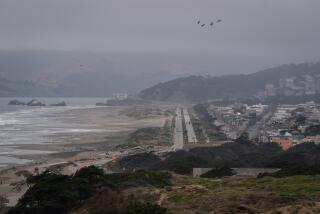Coast Guard Seeks to Restore Free Assistance for Boaters
- Share via
Amid increasing complaints from recreational boaters and the Coast Guard Auxiliary, the Coast Guard is thinking about restoring free service for non-emergency search and rescue operations.
This has private assistance companies in an uproar.
The Congressionally mandated policy--created in 1983, turning all cases deemed non-emergency over to private sources--came under attack by recreational boaters who say they shouldn’t have to pay for assistance, and by the Auxiliary, which feels it is being deprived of its traditional role of assisting boaters, and of the necessary practice in assisting boaters.
“Don’t sacrifice this force,” said one Auxiliary member. “Privatization (in this case) means turning over the public’s safety to private companies for a profit.”
This was just one of many views expressed during the first of 13 public meetings that got under way last week in Long Beach. The Coast Guard has sponsored similar meetings in San Diego and San Francisco and will hold meetings in nine other major port areas nationwide before presenting its findings--along with those of its own study on the long-term effects of the policy in regards to public safety--to Congress in an attempt to find a middle ground.
Since the policy change, 250 commercial towing companies have sprung up nationwide and they have first priority of assisting boaters in non-emergency or “non life-threatening” situations. Since the Auxiliary is a “resource” of the Coast Guard, it is excluded except in those cases when a commercial company is for some reason unable to come to the boaters assistance.
“We’re shackled and handcuffed (by the policy),” said another Auxiliary member. “Here we are ready to provide free assistance for any boater in distress when all of a sudden a commercial tower comes by and thumbs his nose at us.”
Said Coast Guard Lt. Gary Dahmen: “The way they see it is that here they are trained and ready to do something and they are being denied.”
The Coast Guard Auxiliary, the largest volunteer Search and Rescue operation in the world, has 31,815 members, 4,100 in California, but membership has been dropping about 6% a year since the 1983 policy change.
Nevertheless, it remains the primary form of assistance to boaters in non-emergency situations in California.
In 1987 there were 1,100 non-emergency cases in California. Of those, 11% were handled by commercial operators, 24% by the Coast Guard Auxiliary and the rest by the Coast Guard itself.
The Coast Guard pays an average of $60 to $65 to the Auxiliary for an eight-hour patrol. Annually, that adds up to $180,000 for the Auxiliary’s 11th District, which includes Utah, Arizona and Nevada, as well as California. This accounts for 2% of the Coast Guard’s 11th district’s yearly budget of $13.7 million.
Aside from that, the Auxiliary is reimbursed only for fuel and small out-of-pocket expenses.
Contributing to the need for a review of the policy, the Coast Guard said, is the price a recreational boater usually has to pay to the commercial operator. Some boaters went so far as to accuse them of price-gouging.
One boater complained to the panel that during his first breakdown it took 3 1/2 hours before he received any assistance and it ended up costing him $380 for a tow of less than 20 miles.
“They are making a profit on people who don’t have any choice,” he said.
Said Coast Guard Captain Galen Sidall: “There has been an increasing amount of complaints (against these private companies). I have no official knowledge of that (price gauging), but I know human nature.”
Some commercial companies charge upwards of $125 an hour and the average incident usually runs anywhere between $150 and $500.
“I make every effort to keep my boat maintained,” said one boater. “Why should the Coast Guard refer me to a private tower 10 to 15 miles away?
“I pay my taxes to maintain this government agency and now when I need them, they’re unable to help.”
Some companies, however, charge an annual fee much in the same fashion as the Auto Club. For example, Vessel Assist Assn. of America, based in Costa Mesa, charges $79 a year, a price that includes unlimited free tows along the California coast and a variety of other such services as fuel deliveries and jump-starts.
Vessel Assist has built a membership of upwards of 2,500 since going into business in 1984 and has expanded to include service in some areas in Washington and Oregon.
But these and most other private companies claim they wouldn’t be able to withstand the competition if Auxiliary were given the go-ahead to again provide assistance.
“If the Auxiliary is given back that priority, we will not have the money to go on--most companies won’t survive,” said Susan LaMontagne, a representative of C-Port, a Washington, D.C., based organization of private offshore rescue and tow companies.
According to statistics gathered by C-Port, 80% of the Coast Guard’s annual $388 million Search and Rescue budget is spent on non-emergency operations, therefore privatization of these cases would amount to annual savings of $310 million.
Said one commercial tower: “If the policy is changed back it will make a mockery of free enterprise.”
Of the Coast Guard’s position on the matter, Captain Ken Hollemon said: “We have no stance as of yet. There are symptoms indicating that something is wrong, and that’s why we’re here.
“It’s very difficult to find a middle ground (between the two sides),” he added. “We’re just seeking a better way.”
More to Read
Sign up for Essential California
The most important California stories and recommendations in your inbox every morning.
You may occasionally receive promotional content from the Los Angeles Times.










